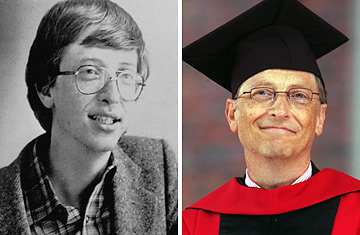
Left; Bill Gates in 1984 and; Bill Gates during commencement ceremonies at Harvard University June 7, 2007.
(2 of 2)
And take another look at that software. Microsoft makes efficient business tools, but they've never enjoyed the same reputation for simplicity and elegance as, say, Apple's. For all his drive and intelligence, Gates doesn't see things with an artist's eye for those human intangibles. In May, Gates made a rare and instructive public appearance with his longtime frenemy Steve Jobs. An audience member asked each of them what he had learned from the other. "Well, I'd give a lot to have Steve's taste," Gates said. "You know, we sat in Mac product reviews where there were questions about software choices, how things would be done, that I viewed as an engineering question. That's just how my mind works. And I'd see Steve make the decision based on a sense of people and product that is even hard for me to explain. The way he does things is just different, and you know, I think it's magical." The audience cracked up. But Gates wasn't joking.
So it'll be interesting to watch Gates try his Vulcan approach on challenges like curing AIDS and fixing America's public schools. In July 2008, his primary focus will become the Bill & Melinda Gates Foundation, which he and his wife founded to address health and education issues. It has an endowment of more than $33 billion, making it by far the largest charitable foundation in the world. Last year his close friend Warren Buffett committed to transferring to the foundation much of his wealth too, which will eventually add about $30 billion more. Gates' foundation makes him one of the most powerful nonelected actors on the global stage.
The worst grade Gates ever got at Harvard, a C+, was in organic chemistry. Now he has to study it all the time. He monitors clinical research, talks to doctors, sits in classrooms, flies to infectious hot zones. As a foe of disease and ignorance, he is fearsome.
Gates refers to his philanthropic work as "solving inequity," as if it were a long-division problem. When Gates looks at the world, a world in which millions of preventable deaths occur each year, he sees an irrational, inefficient, broken system, an application that needs to be debugged. It shocks him--his word--that people don't see this, the same way it shocked him that nobody but he and Allen saw the microchip for what it was. "We had just assumed that if millions of children were dying and they could be saved, the world would make it a priority to discover and deliver the medicines to save them," he said in his Harvard speech. "But it did not."
Gates isn't just focused on specific diseases and educational deficits. To him, that's thinking small. Like the high school password stealer he once was, the cocky Harvard kid, Gates wants to rewrite the rules of the whole system. He's all for capitalism--it has treated him well--but he gets that it's not going to take care of everybody. The financial incentives to take care of the disadvantaged just aren't there. So capitalism itself needs to be re-engineered. In his Harvard speech he introduces an idea he calls creative capitalism. "That may be the most important phrase in there," he says, "in the sense that capitalism has really triumphed in this incredible way, and certainly for at least a billion people, it's done a spectacular job, and alternative systems have not. Yet there's this strong feeling that getting that system to direct itself to the right problem--there's more that can be done." In the speech he exhorts the students and faculty to do something about it: to hack the system and add the features it needs to address these problems. He cites a practice called advance market commitment, in which governments band together to guarantee orders for an expensive and otherwise financially risky vaccine. "That's the kind of idea. It's about using competition and market incentives but directing it the right way."
If there's a limit to what Gates can do, it's always going to be found in that human element, the messy, fallible, unquantifiable stuff that doesn't respond to engineering. His limitations as a technologist will be his limitations as a philanthropist. But he knows he's not writing software anymore. "There are some [problems], like discovering a vaccine for malaria, that actually are surprisingly similar," he says. "That is, a bit like a software project. Some things like designing high schools and new high school curricula and the way that you need to have the community and the teachers, particularly their union, feel like they need to participate in that ... that's a very tough thing."
Gates is probably getting out of technology at the right time. Funnily enough, it's not really a business for nerds anymore. Gates was at the center of the personal-computer revolution and the Internet revolution, but now the big innovations are about exactly the things he's bad at. The iPod was an aesthetic revolution. MySpace was a social revolution. YouTube was an entertainment revolution. This is not what Gates does. Technology doesn't need him anymore.
Now education and health care--those are areas in which the bedrock problems, the bits and bytes, have yet to be solved. All that pretty, fluffy stuff, that can come later. That's for the cool kids to figure out. Sickness, death, ignorance, illiteracy--those are the problems that need nerds. That's where Gates 3.0 needs to be, and that's where he's going.
